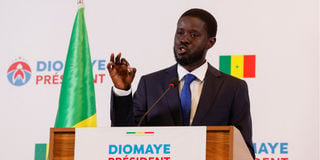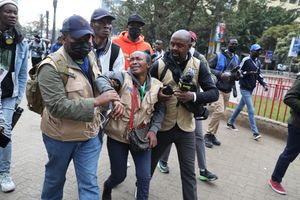
Senegal's president-elect Bassirou Diomaye Faye speaks during a press conference in Dakar, Senegal March 25, 2024.
Senegalese media players on Tuesday, August 13, embarked on a historic news blackout in protest over measures taken by the new administration of popular President Bassirou Diomaye Faye, which rights campaigners say go against press freedom.
The administration, in a move it claims is aimed at fighting corruption in the media and to reclaim government funds unlawfully dished out to a select group of media companies, froze an annual subvention under the Press Support and Development Fund (FADP) meant to enhance public access to information.
It also froze the bank accounts, confiscated equipment of some media companies over unpaid dues and suspended government subscriptions to newspapers. It also terminated their advertising contracts, among other actions.
The Council of Press Distributors and Publishers (CDEPS), the body representing broadcasters and publishing companies from both private and public sectors, called for Tuesday’s action to send a message to the government.
While most newspapers refrained from publishing on the day, a few did, but they featured a similar headline depicting the slogan of the day - ‘Press-free day.’ TV stations and websites displayed blank screens and pages, while radio stations played music all day.
The development has sparked concerns over the direction of the new administration that came to power promising to change the status quo in governance, particularly with regard press freedom.
President Faye’s predecessor, Macky Sall, was criticised for clamping down on the independent media in the last few years of his term that ended in April. It was characterised by chaotic events including protests and riots, partly fueled by his failed bid to overstay in power.
But the new administration says these moves are necessary to sanitise the situation created by the Sall’s, which reportedly gave a blank cheque to some section of the media to operate without accountability.
Besides the annual subscription to newspapers and the annual payment of subvention to the media development fund, the government also want to reclaim FCFA 38 billion ($60 million) from media houses which was written off by its predecessor. This entails payment in tax debts and dues to the communications regulator, Agence de Régulation des Télécommunications et de la Poste.
But critics of the government say its action is politically motivated as it appears to target a section of the media.
CDEPS says the intention of the government is only to suppress the press.
"The aim is none other than to control information and tame media professionals," it said as part of a joint editorial published ahead of Thursday’s strike action.
But representatives of the organization say they are ready to negotiate a tax regime acceptable for their situation.
“We are not refusing to pay, and we pay our taxes. However, what we are asking is that, in view of the specific nature of the [media] sector, there should be differentiated taxation, as there is in France and here in Senegal in agriculture, public housing and health sectors,” said Mamadou Ibra Kane,
President of CDEPS and owner of Avenir Communication, one of the media companies affected by the bank accounts suspension and seizure of broadcast equipment.
“The procedure is too fast. And we might wonder why the tax authorities are so diligent in dealing with some companies and not others,” added Mr Kane in an interview.
Already, several media publications have suspended publications due to the suspension of their accounts, these include daily newspapers Stades, Sunu Lamb and Vox Pop.
The actions of the authorities also come after statements attributed to top government officials suggesting a possible crackdown on the media. Prominent among these is Prime Minister Ousmane Sonko’s comment addressing members of his party – Pastef.
“We will no longer allow the media to write whatever they want about people, without any reliable source, in the name of so-called press freedom”, Mr Sonko said back in June. That statement sparked condemnations from all sections of the media and civil society.
There have also been reports of arrests of media practitioners since the change of government. Two such incidents occurred in May.
For many Senegalese, it brought back memories of dark days in the past when press freedom was stifled by political powers.
Thursday’s news blackout comes 20 years after a similar event occurred for the first time in the country’s history.
In 2004, the founder of Avenir Communication Group (GAC), was imprisoned on charges of "spreading false news, publishing secret documents and information that could incite serious political unrest." The whole media back then decided to put away their pens and microphones. That was the first time in Senegal’s history the people woke up without information.
The global media watchdog, Reporters Without Border (RSF), described the current situation as worrying and called for dialogue.
"Although the difficulties of the Senegalese press do not date from the arrival of the new authorities, the latter cannot remain indifferent to the leaden blanket weighing on the sector, with in particular 26% of reporters without employment contracts, heavy tax debts and a crisis of confidence between the media and the public,” its West Africa Director, Sadibou Marong, said in a statement.
RSF further called on the authorities to ensure that this crisis does not deprive Senegalese of a vibrant press.
“The media are the channels for transmitting the right to information and the authorities are its guarantors. At this stage, it is important that the State and media stakeholders work together to find solutions that benefit the sector and democracy," added Mr Marong.
The West African media watchdog, Media Foundation for West Africa (MFWA), also added its voice to the debate, praising the display of solidarity by the media in the face of its challenges. It also urged the government to prioritize dialogue as a means of addressing the concerns.
“We call on the authorities to give priority to dialogue and to show understanding towards the press companies,” MFWA said in a statement issued on Thursday, August 15.
“It is in the interest of the new authorities to support and promote an independent press whose immense contribution to building peace and social cohesion as well as consolidating democracy has made Senegal a benchmark country for democracy in Africa,” it added.
Thursday’s statement from the Ghana-based media watchdog followed an open letter in collaboration with six other regional and international organisations, addressed to the Senegalese government on the matter.
The opposition also condemned the actions of the government leading to this event. Abdou Mbow, President of the parliamentary group Benno Bokk Yaakaar (Bby), the political coalition led by former President Macky Sall, warned of a “dangerous decline” in freedom of expression and said the press constituted a fundamental pillar of democracy beyond just disseminating information.
“I am in solidarity with the Senegalese press. Personally, I am a journalist and therefore, I could be where you are today,” he said during the opening of the first extraordinary session of the year 2024 of the National Assembly devoted to the request for updating the Rules of Procedure of the National Assembly.
A day after the strike, the government issued a statement citing President Faye calling for "appropriate recovery measures".
It is left to be seen what will be the next move of the government.







